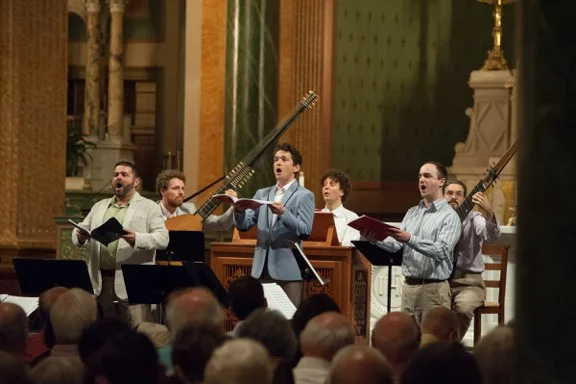Claudio Monteverdi (1567-1643) is the composer who best links the Renaissance with the Baroque periods and what was known as the prima pratica and seconda pratica, aka the “old style” and the “modern style”. The former emphasized clear, smooth polyphony as ordered by the Council of Trent and personified by Palestrina (the text was always to be understood), specified under what circumstances dissonances were to be used, and relied on the cantus firmus (fixed song) technique that was the backbone of Gregorian Chant. But he also made use of the stile moderno, which used monody — a single vocal line, sometimes highly ornamented, over a bass line played by lute, theorbo, organ, harpsichord, or a combination — the type of exclamation that was being used in opera, dance forms, and instrumental interludes. And none of his works exemplifies this connection, this perfect marriage, better than his Vespers of 1610.
Read MoreThe vocal ensemble Tenet, under the direction of Scott Metcalfe, performed a “Vespers for the Feast of St. John the Baptist” as part of its Green Mountain Project on Sunday at St. Paul’s Church in Cambridge. As the bilingually punned name suggests, the project concentrates on the music of Claudio Monteverdi (1567–1643). For this particular program, the group’s nine singers were joined by two violins, a bass violin, two cornetti, four sackbuts, two theorbos, and a positiv organ for a glowing concert of early Baroque sacred delights.
Read MoreThe new Early Music Festival: NYC, which ended last week, gives reason for cautious hope. You can’t be categorical about its prospects one way or the other, because several more or less similar ventures have come and gone in recent years.
But it is also clear that times are changing, and the current climate seems propitious. To a critic who used to lament with some regularity the lack of a vibrant early-music scene in New York, comparable to those in Boston and San Francisco — let alone, say, London and Cologne — the last decade has proved astounding.
Read More


